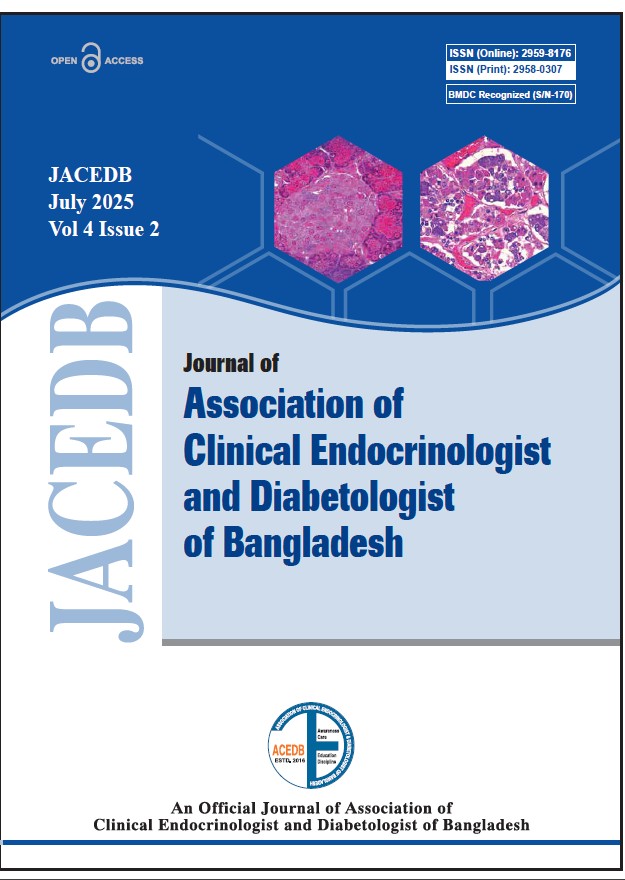Knowledge, attitude, and practice among Bangladeshi adults with hypothyroidism
DOI:
https://doi.org/10.3329/jacedb.v4i2.83565Keywords:
Knowledge, Attitude, Practice, Hypothyroidism, LevothyroxineAbstract
Background: Treatment success depends on the knowledge, attitude, and practice (KAP) of patients with hypothyroidism. Comprehensive data on KAP regarding hypothyroidism was not adequately evaluated among Bangladeshi people.
Objectives: To evaluate KAP among Bangladeshi adults with hypothyroidism.
Methods: This cross-sectional questionnaire based KAP survey was done between June 2022 and March 2023 among 527 eligible adults [Age (years): 35.1±10.5, mean±SD; m/f: 14.6%/85.4%]. Baseline characteristics and responses to 27 questions and statements of KAP were collected from participants in government hospitals and doctors' private chambers from six districts. A specific mark was given for each response. The average marks obtained by each participant were categorized into three tertiles for each domain. The baseline characteristics were compared across the tertiles.
Results: Nearly 34.5% of the participants correctly answered the 14 questions of the knowledge domain. About 78.9% agreed with all five statements of the attitude domain. Almost 45.7% regularly followed all eight good practices in their disease management. Those with negative attitudes had a lower frequency of individuals under 30 years (adjusted standardized residual, ASR = -3.2) and a higher frequency of those over 50 years (ASR = +3.4). For those with education below the secondary level, the frequency of negative attitudes (ASR = +6.0) was higher, while the frequency of positive attitudes (ASR = -4.1) was lower. The frequency of older people (>50 years, ASR = -3.4) and those with lower education (below secondary, ASR = -4.3) was lower, but the disease duration was shorter (<1 year, ASR = +3.1) among those with good practice.
Conclusions: Positive attitudes towards hypothyroidism in Bangladeshi adults do not translate to sufficient knowledge and effective management of the disease. Those with older age, lower educational attainment, and longer duration of disease require more attention to optimize hypothyroidism management.
J Assoc Clin Endocrinol Diabetol Bangladesh, July 2025;4(2): 57-65
112
91
Downloads
Published
How to Cite
Issue
Section
License
Copyright (c) 2025 Md Firoj Hossain, Satyajit Mallick, Md. Lutful Kabir, Mohaimenul Abedin, Md. Ahamedul Kabir, Kulsuma Akter, Md. Shahed-Morshed

This work is licensed under a Creative Commons Attribution-NonCommercial 4.0 International License.




